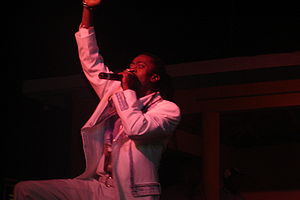Peter Tosh became one of Reggae's most flamboyant and colorful superstars while trailblazing through a two-staged life filled with volatility, controversy and violence. For the first 31-years he was Winston Hubert McIntosh born in the Kingston, Jamaica slum of Trenchtown in 1944.
There he learned to play guitar and sing at an early age, heavily inspired by American radio and a vocalist teacher named Joe Higgs. In the early 1960's Higgs introduced Tosh (nicknamed 'Steppin Razor') to Bob Marley and Bunny Wailer.
The trio instantly began perfecting their musical sound by playing on the street corners of Trenchtown, however, it was Higgs who polished their magic by teaching them to harmonize...and introducing Marley to the guitar.
In 1962 Higgs influenced Tosh, Marley, Wailer and newcomer Junior Braithwaite to form the band "The Wailing Wailers", where they released 'Simmer Down'...the first of many hit singles over the next three years.
But, in 1965 the band broke apart with Marley moving back to the United States to work at a Chrysler factory near his mother's house in Delaware. Tosh and Wailer continued together musically, but also took on a fanatical, spiritual involvement with the Judo-Christian religious movement called Rastafari.
Marley returned to Jamaica two years later with a renewed interest both in music, and in Tosh and Wailer's spiritualized Rastafari movement. Together they re-named the group 'The Wailers' after the word "wail"...which means to mourn or express one's feelings vocally.
Upon slowing their dance tempo style down to a rock-steady pace, the Wailers infused their lyrics with social and political messages, from which arose such mega-reggae hits as 'Soul Rebel', 'Duppy Conqueror' and 'Small Axe'.
By the early 1970's the Wailers had become Caribbean superstars, eventually signing an album deal with Island Records in 1973 to produce and release LP's 'Catch a Fire', and "Burnin". Later that year Tosh's career took to a new stage going solo, and his life would also take a drastic turn.
While driving home with his girlfriend,Tosh's car was hit head-on by another auto traveling on the wrong side of the road. The accident killed his girl friend and severly fractured Tosh's skull. He survived, but was never the same in tolerance or mood.
In 1976 he released his solo debut album "Legalize it" on a new label CBS records....the title track becoming an anthem for supporters of legalized marijuana. Tosh became a willing militant target of the Jamaican Police who would often beat him up. Tosh proudly displayed his scars to followers and fans during performances.
In 1978 Tosh signed on with Rolling Stones Records and released the album "Bush Doctor". A track from the album, a "Temptations" cover song called 'Don't Look Back' was performed as a duet with Mick Jagger, and quickly turned Tosh into one of reggae's best known artists.
Over the next ten years Tosh combined his songs with concert lectures on the legalization of marijuana, equal rights and opposition to South African apartheid. He tried to maintain success while keeping his militant views, but was only modestly successful compared to Marley's "One Love Message" achievements.
In 1984 Tosh went into self-imposed exile, seeking the spiritual advice of traditional medicine men in Africa! While there, he also tried to free himself from recording agreements which distributed his many successful records to apartheid-laiden South Africa.
A few years later Tosh began a career revival after being awarded a Grammy for Best Reggae Performance of "No Nuclear War". However, on September 11th, 1987, just after flying back to Jamaica....a three-man gang broke into his home and demanded money. The gang leader was actually a former friend who Tosh had tried to help find work following a long jail sentence.
Tosh told the gang he had no money in the house, while at the same time many of Tosh's friends were arriving there to welcome him home. This frustrated the robbers who, after several tense hours, put a gun to Tosh's head and shot him twice...killing him along with disc jockey and friend Jeff "Free" Dixon. Several of his friends were also shot and wounded as the gangsters fled.
The leader turned himself in and was tried, convicted and sentenced to death following an 11-minute jury deliberation....the shortest in Jamaican history! The two other men were never found, although rumors insist they were later gunned down,just as was the distinctive, prominent reggae sound of Peter Tosh--blown away from us before his time. May the songs and messages of "Steppin' Razor live on in reggae memory, forever!
PeteCam4


![Reblog this post [with Zemanta]](http://img.zemanta.com/reblog_e.png?x-id=8729988d-313a-4313-8b99-f5e3a05b4d45)

![Reblog this post [with Zemanta]](http://img.zemanta.com/reblog_e.png?x-id=4905ffc9-b10f-4f4c-8737-6c8059d42fae)

![Reblog this post [with Zemanta]](http://img.zemanta.com/reblog_e.png?x-id=1eeeaf6f-aaa9-490b-96e4-ea214a4cf1d6)

![Reblog this post [with Zemanta]](http://img.zemanta.com/reblog_e.png?x-id=78ad9596-fb93-41db-a5bb-d1ba07cf88f1)

![Reblog this post [with Zemanta]](http://img.zemanta.com/reblog_e.png?x-id=e280eb79-e078-4980-a194-750672edad9b)
![Reblog this post [with Zemanta]](http://img.zemanta.com/reblog_e.png?x-id=c0858154-f5d9-4350-b390-aa957f08b792)